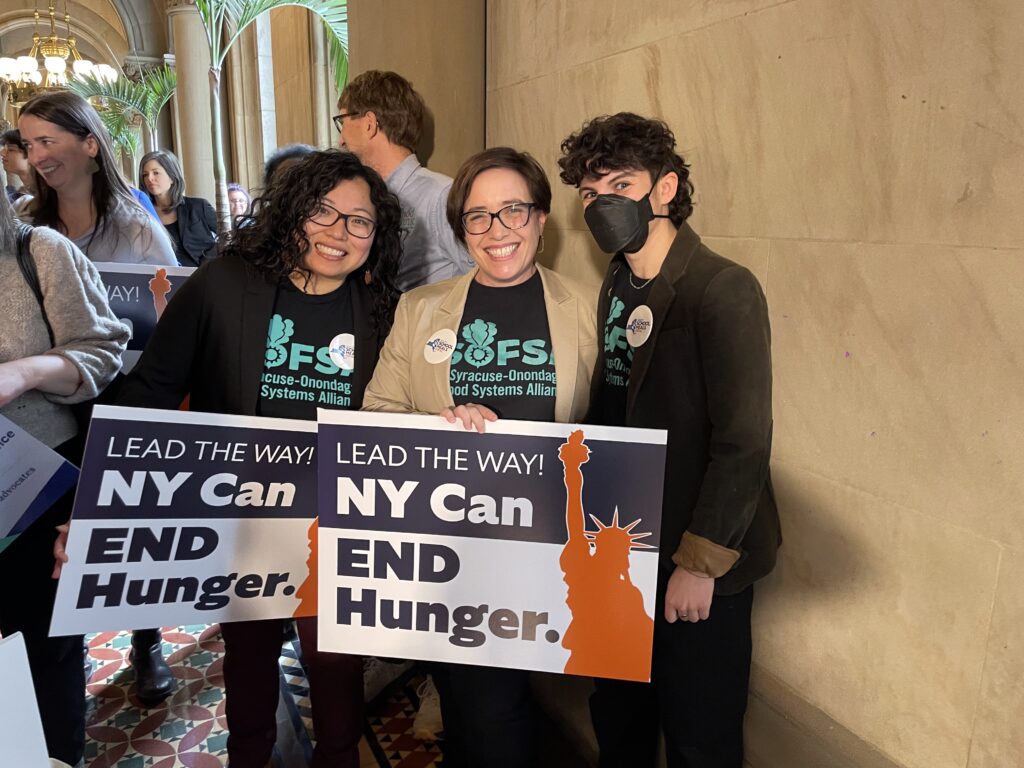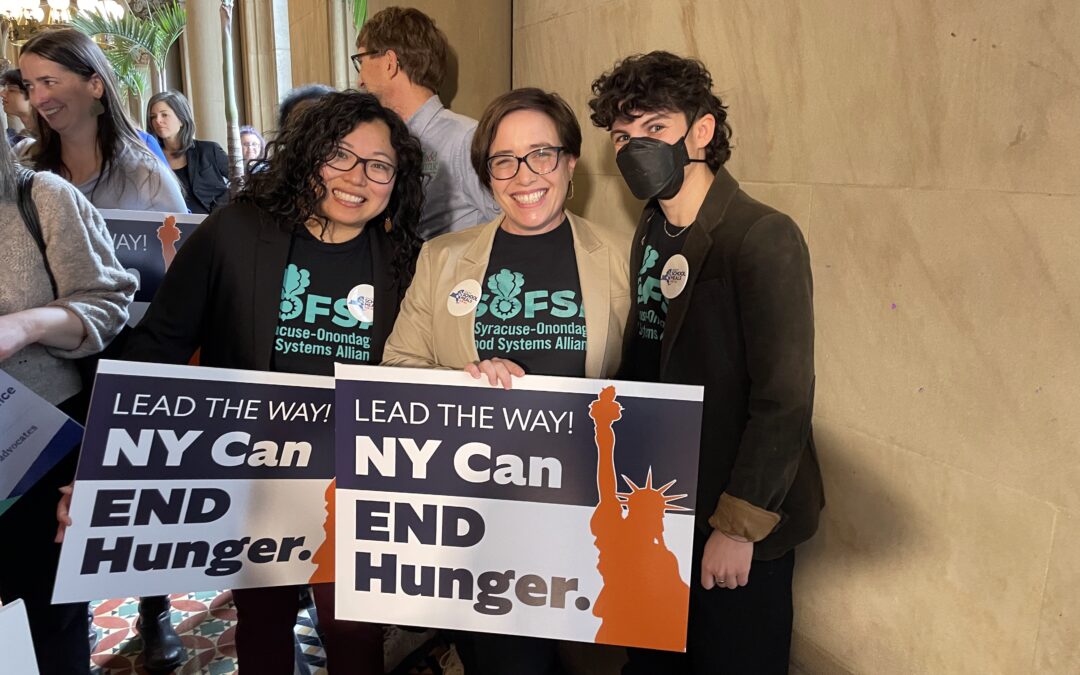
In February, SOFSA traveled to both Washington, D.C. and Albany to advocate for policies that advance food justice and strengthen our local food system. These visits were critical opportunities to connect with policy-makers, share real-world impacts of challenges facing Central New York farmers and families, and push for legislative solutions that support food systems. These types of visits are typical for SOFSA and the coalitions we’re a part of, but this year we’re up against unprecedented challenges.
The onslaught of executive orders affecting equity and diversity initiatives, climate change, conservation efforts, social safety net programs and more, plus the immediately destabilizing effects of the federal funding freeze have thrown advocacy efforts into a tailspin. Coalitions pursuing food justice across different sectors are quickly having to inventory how their members and constituents are being impacted, and how to revise their advocacy strategies to cut through all the noise at different levels of governance.
In CNY, farmers who’ve invested in conservation and climate resilient infrastructure are still waiting on their reimbursements. Farmers are unable to plan for the season because their institutional buyers are uncertain if they’ll receive funding to buy produce. Cuts to SNAP would have devastating effects on all parts of the economy, and sink millions of people deeper into food insecurity. SOFSA’s own USDA funding was stalled, causing us to shift to an emergency budget. Given this landscape, our advocacy efforts shifted to include calls to reinstate the frozen funding, and for legislators to push against the harmful policies coming from the highest levels of government.
In Washington, D.C., we joined 130+ farmers, ranchers and advocates from the National Sustainable Agriculture Coalition to push for federal policies that support the sustainability of food systems, natural resources, and rural communities. At the national level, the advocacy surrounding sustainable food futures focused on including key programs in the Farm Bill, a package of legislation that covers conservation, nutrition programs, credit and resources for farmers, research and agricultural supports, and more. As a coalition, we pushed for protecting SNAP in the farm bill, pushing back against a proposal to cut the program by an estimated $30B over the next decade.
NSAC partners also asked legislators to include measures to:
- Strengthen crop insurance
- Adopt the Agriculture Resilience Act, to ensure farmers have access to information and resources to mitigate the impacts of climate change on farms
- Increase funding for the Conservation Stewardship Program and the Environmental Quality Incentives Program, which support farmers in protecting natural resources
- Invest in farmer’s futures by expanding access to capital by providing flexible credit options and raising the USDA microloan limit
- Support the creation of infrastructure to strengthen local markets by investing in aggregation, changes in procurement processes, food safety education, and more.
- Continue supporting the Sustainable Agriculture Research and Education (SARE) program and expand farmer participation
We’re grateful for our conversations with the offices of Senator Gillibrand, Senator Schumer and Congressman Mannion. These visits allow constituents to raise issues to legislators so they can bring them to session, but they also provide context around which to establish ongoing rapport with our representatives. Our meeting with Congressman Mannion, who serves on the Agriculture Committee, was dynamic, and offered us an opportunity to understand more about the inner workings of the committee while sharing tangible stories of farmers’ experiences that the congressman could take back to the committee. As a result of our meeting with Senator Schumer, we are now in connection with his office, sharing anonymized stories and connecting farmers in CNY to join for speaking and press engagements. These connections help bring awareness to the impacts that farmers are facing in light of the funding freezes and cuts to USDA programs.
In Albany, we joined statewide partners for the Anti-Hunger Advocacy Day, organized by Hunger Solutions New York and Feeding New York State. We joined coalition partners including NY Equity Advocates, Broome County Food Council, Community Food Advocates, the ADK Food Systems Network, and The Food Bank of CNY. Throughout the day, we made budgetary asks of our legislators to protect and expand programs and policies that increase food access for everyone in the state. At this more local level, representatives are able to push for policies that have a more direct and immediate impact on the livelihoods of folks across the state. SOFSA’s efforts to collect stories from our network around how cuts to safety net programs like SNAP impact the community were instrumental in carrying out these advocacy visits. They lent weight and a human feel to our budgetary asks, moving our legislators to ask for more information and to connect to our work in more concrete ways.
Most of the asks we made were budgetary, and included:
- Funding the Nutrition Outreach and Education Program, is New York’s network of local SNAP navigators who help eligible low-income families connect with SNAP.
- Funding Nourish NY and the Hunger Prevention & Nutrition Assistance Program (HPNAP), both of which support a statewide network of food banks, pantries, shelters, and community-based organizations working on the frontlines of hunger.
- Cosponsoring Healthy School Meals for all New York Kids, which would provide universal free school meals to all 2.7 students across the state. #Meals4AllNY,
- Investing in the expansion of Double Up Food Bucks, to help support SNAP recipients in accessing fresh fruit and vegetables.
- Increasing the minimum SNAP benefit to $100, thus helping nearly 110,000 New Yorkers, many of whom only receive $23/month in SNAP supports.
We were able to connect with the offices of Chris Ryan, Assemblyman John Lamondes, and the offices of Rachel May, including connecting with the Legislative Commission on Rural Resources. Director Maura Ackerman delivered a speech as part of the initial press conference, reiterating how programs like SNAP and Double Up Food Bucks don’t just support the individuals who depend on those programs, but rather create economic activity that puts money back into our communities and directly supports producers.

